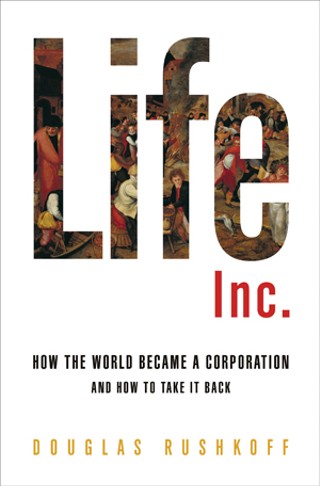Book Review: Readings
Douglas Rushkoff
Reviewed by Wells Dunbar, Fri., July 24, 2009

Life Inc.: How the World Became a Corporation and How to Take It Back
by Douglas RushkoffRandom House, 304 pp., $26
Our financial crisis didn't emerge from the evaporation of liquidity, the burst of the housing bubble, or even our overfinancialized culture, awash in credit cards, mortgages, and 401Ks. According to media critic Douglas Rushkoff, it reaches back to the Renaissance and the advent of the chartered corporation – vast monopolies such as the Dutch United East India company, which siphoned resources out of developing countries, enriching themselves and the aristocracies that chartered them. In terms of redistributing wealth upward, it's a short walk from the House of Medici to Wal-Mart – except now, on a playing field skewed by centuries of business-friendly regulations and a currency that values scarcity instead of reinvestment, we've sublimated corporatism into our own lives, making zero-sum choices that benefit the individual over the community, and even then, usually for short-term gain. "We are fast approaching a societal norm where we – as nations, organizations, and individuals – engage in behaviors that are destructive to our own and everyone else's welfare," he writes.
Rushkoff weaves his hypothesis between recessionary vignettes – real-estate "wealth expos" desperately endeavoring to reinflate the bubble, faux New Urbanist Potemkin villages that are little more than outdoor malls, and the flame war that ensued when Rushkoff warned of his mugging to a Brooklyn neighborhood listserv, only to be chided for potentially damaging property values. Initially they're a respite from the head-spinning amount of history and analysis being thrown at us, but as Life Inc. guides its through-line across the centuries, it gathers momentum – from the birth of the corporation to consumption-fueling suburban development to advertising's championing of the individual over the masses to online communities mediated through corporate third parties.
Instead of advocating a full-fledged (if futile) revolt, Rushkoff advocates small, localized resistance: Community-supported agriculture keeps cash in the city (and your food from being shipped cross-country), while businesses trading in local currencies take the idea one step further. Corporatism, he surmises, can never be fought on its own turf; moreover, the most important change we can effect is in ourselves.










